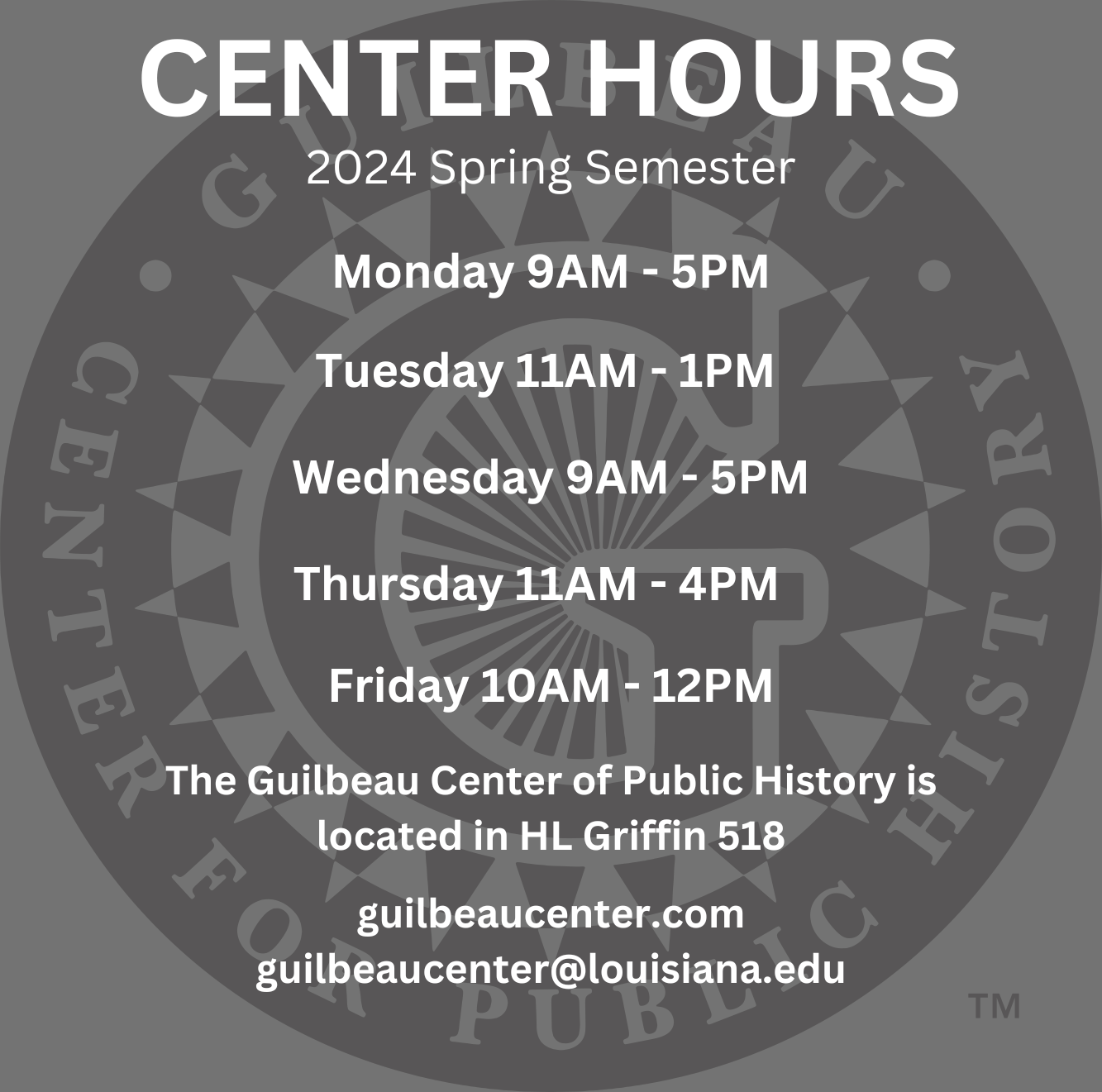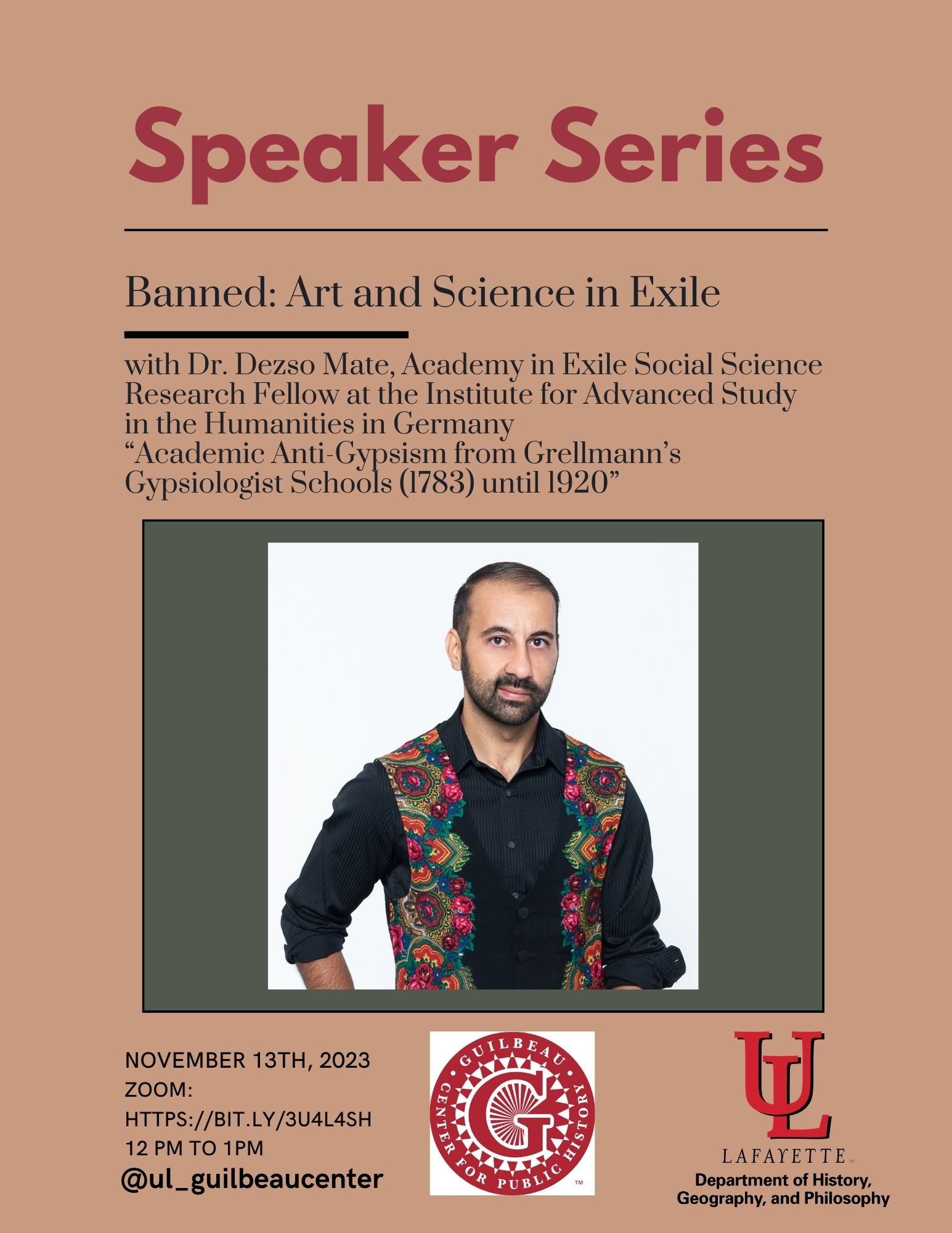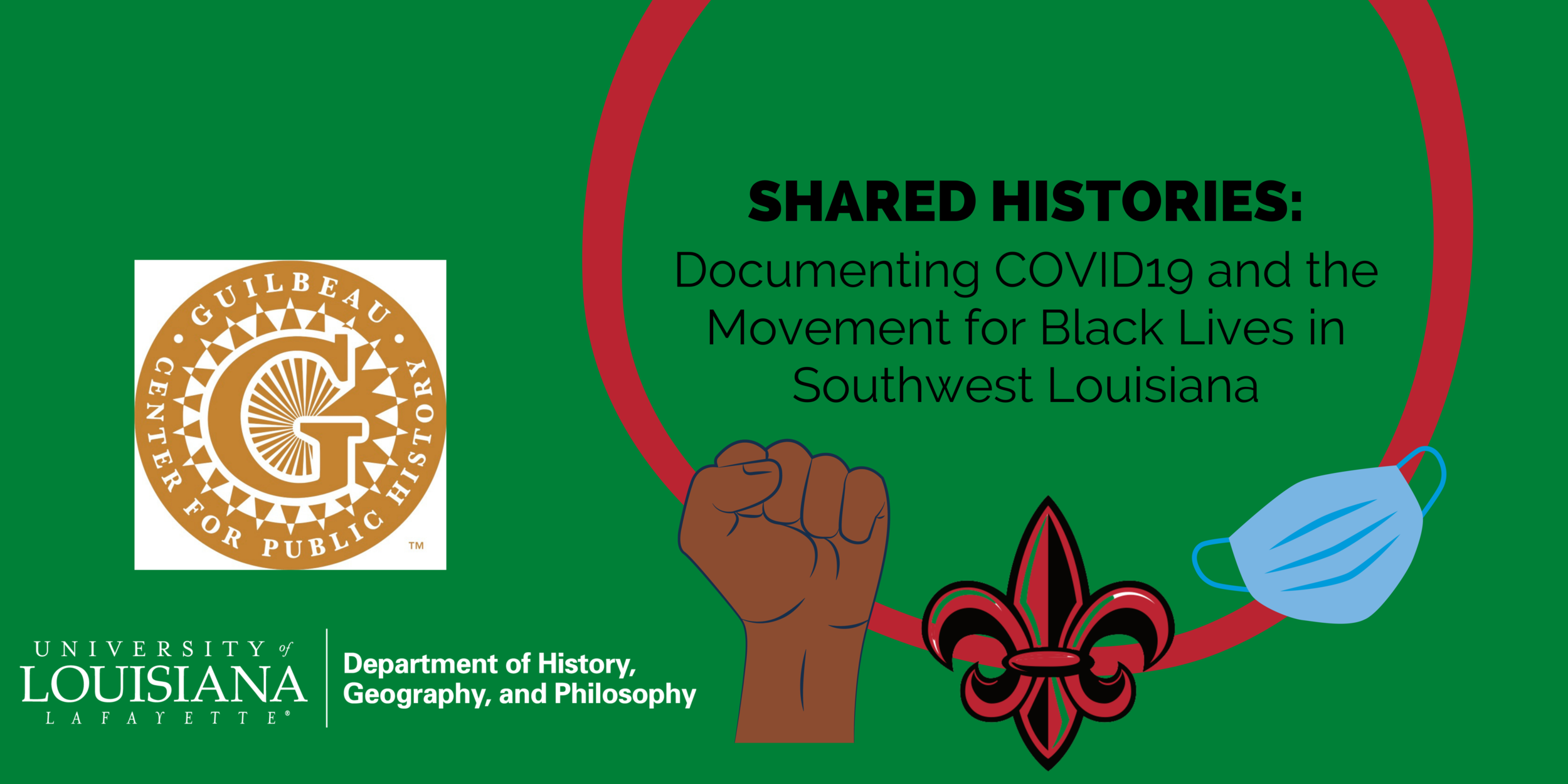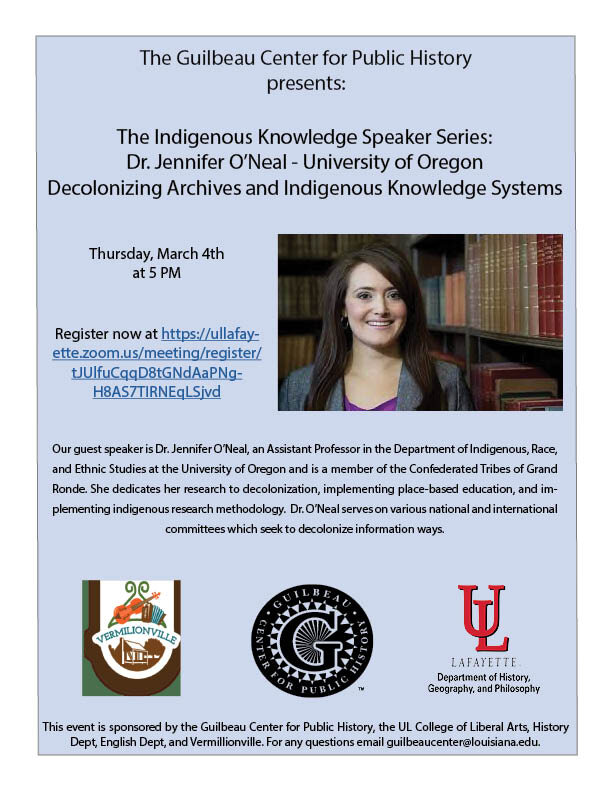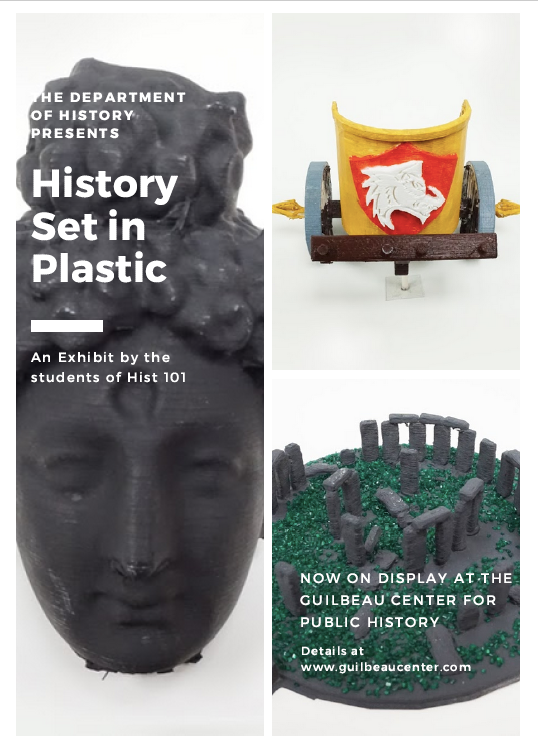Welcome!
The Guilbeau Center for Public History is here to support community-centered projects across campus, Lafayette, and beyond. We provide resources, expertise, and partnership opportunities for anyone interested in community engagement. You can reach us by email at guilbeaucenter@louisiana.edu or in-person at HL Griffin 518. You can also reach us by phone at (337) 482-5406 during our office hours.
Our hours for Spring 2024 are
Monday 9 am - 5 pm
Tuesday 11 am - 1pm
Wednesday 9 am - 5 pm
Thursday 11 am - 4 pm
Friday 10 am - 12 pm
Contact us to make an appointment
News and Events
Exploring 70 Years of Desegregation at the university, upcoming events: Lecture and community history workshop on March 9th at Dupré Library 2-4pm, Share your story: March 12th 8:30-11:30am at Student Union, March 14th 12:30-2pm at Dupré Library
Presentation: Cultivating Soul
What: Presentation on Cultivating Soul: The Black Farming Experience in New Iberia
Who: Area Residents
When: Saturday, September 16, 2023 at 1:00
Where: Shadows-on-the-Teche Visitor’s Center
320 E. Main St. New Iberia, Louisiana 70560
Contact: (337) 369-6446 or Shadows@shadowsontheteche.org
The Iberia African American Historical Society Center for Research and Learning and the Shadows-on-the-Teche, a site of the National Trust of Historic Preservation, are partnering with Provost Farm to present Cultivating Soul: The Black Farming Experience in New Iberia. On Saturday, September 16, 2023 at 1:00 p.m., June and Angie Provost from Provost Farm will discuss the relationship between African Americans and agriculture. This event is free of charge and will take place at the Shadows Visitor Center (320 E. Main Street, New Iberia), however, we do recommend registering online, as space is limited. Light refreshments will be available. For more information about the event, contact (337)369-6446 or email Shadows@shadowsontheteche.org.
The program is made possible by a grant of the National Trust for Historic Preservation and the National Endowment for the Humanities.
Congratulations to our 2023 Fellowship Winners!
Gabby Hoffpauir-Rosatto will use her fellowship to start a podcast series on the disability experience in Louisiana.
The Opelousas Museum and Interpretive Center was awarded the community engagement fellowship to conduct research for its exhibit “From Civil War to Civil Rights.”
Iberia African American Historical Society will use its award funds to create of a database of enslaved Africans of St. Mary and St. Martin parishes.
Recording
available!
Visit our YouTube Channel
Zachary Stein of University Special Collections and Dr. Marissa Petrou, Director of the Guilbeau Center for Public History, have been awarded 10,000 by the American Library Association for their project “Queering the Collection: Expanding and Archiving LGBTQ+ History in Southwest Louisiana.”
The grant will fund a speaker series, an undergraduate research assistantship, the purchase of books, artifacts, and manuscript items that reflect the LGBTQ+ community in Louisiana, and digital storage space for oral histories and digital collections. Our speaker series will provide expert insight into archiving materials in this subject matter and how to apply queer theory to create more inclusive accessioning and cataloging systems, support inclusive research projects, and generally create more equitable experiences at institutions of collection. By expanding our holdings to represent these groups, we invite patrons to learn about this part of Louisiana history and inspire others in the community to donate their own materials to the collection.
More than 370 libraries applied for the grant, according to ALA. View the full list of selected libraries.
The participating libraries, selected through a competitive, peer-reviewed application process, include public libraries, academic/college libraries, K-12 libraries, and tribal, special and prison libraries. The recipients represent 45 states and Puerto Rico and serve communities ranging in size from 642 residents in Weir, Kansas, to the city of Los Angeles. Libraries were chosen with an emphasis on reaching historically underserved and/or rural communities.
This critical speaker series and working group in Black studies takes a broad interdisciplinary look at the challenges confronting the work of the humanities under multiple crises. Scholars and artists will introduce the UL community to recent scholarship in the field through their writings and virtual engagement.
Miss a speaker? No worries! You can catch the recordings on our YouTube channel!
The Guilbeau Center for Public History welcomes you to share your stories and experiences with the current COVID-19 Pandemic and the Movement for Black Lives. Shared Histories is an invitation to our UL Lafayette community to share your stories and experiences by virtually submitting photos, typed entries, audio recordings and videos to our digital archive. Your contributions will be part of a digital exhibit and historical collection to be used for future research to study the intersection of pandemic life and the struggle for social justice.
Submit your story today!
The Guilbeau Center for Public History is working on ways to honor Native land for the Department of History, Geography and Philosophy, the University of Louisiana at Lafayette, and regional educational and cultural institutions. We are working with different Tribal Nations to learn more about their particular land acknowledgement protocols. Land Acknowledgement is important because it acknowledges the history of settler colonialism in the United States and that we are uninvited guests on stolen land. It also emphasizes the history of and ongoing presence of hundreds of tribal nations today. We acknowledge that UL Lafayette is on the land of the Atakapa-Ishak, and until very recently, this area was known as the Atakapas District under French, Spanish, and US colonialism. We would also like to express our gratitude to Elders, past, present, and future, of the dozens of other First Nations in the Louisiana area, including the Chitimacha, Coushatta, Tunica-Biloxi, Jena Choctaw, Mississippi Band of Choctaw Indians, Opelousa and Avogel. We also honor the enslaved peoples of African descent who worked this land when it was part of the Mouton family’s sugar plantation, Ile Copal. We thank them all for stewarding the land upon which we carry out our work.
If you missed this event and are a UL Lafayette student contact us for the recording at guilbeaucenter@louisiana.edu
Virtual History of Knowledge Project: Initiative for National History Day, in collaboration with the History of Science Society and Universite Laval, Montreal
Pharmaceutical laboratory at Howard University, Washington, D.C. , ca. 1900. Photograph. https://www.loc.gov/item/2002695671/.
The Guilbeau Center for Public History is excited to announce that is collaborating with National History Day and the History of Science Society on a virtual history event connected to the NHD 2020-21 theme “Communication in History - The Key to Understanding”. National History Day is an international history competition for sixth through twelfth grade students. The virtual resources in the history of science that we produce and assemble for this project will showcase the historical artifacts held by archives, libraries and museums. Each short video will introduce students to the dynamic three dimensional objects that scientists have invented, relied upon, tested or rejected. With the current moment in mind, each presenter will also highlight digital collections for student historians to access from a safe distance. We hope for this collection of video presentations and additional digital resources to support students’ research for their National History Day project. To host the videos, we are building a new history of science education and engagement website.
Do No Harm: The Healing Touch of Louisiana Women in Medicine
A history of the barrier breakers and sheroes that revolutionized the development of medicine, from the mothers of gynecology — the enslaved women who were involuntarily experimented upon by white male medical professionals — to MDs like Dr. Viola Coleman Johnson (left) who fought against segregation to improve professional medical training opportunities for African Americans.
An exhibit co-curated with the Public History MA students of UL Lafayette’s Dept of History, Geography and Philosophy. With support from Louisiana State Museum, the Guilbeau Center for Public History and the Thelma and Jamie Guilbeau Charitable Trust.
Coming August 2022 to the Capitol Park Museum at Louisiana State Museum in Baton Rouge
Healing in the Bayou
Healing in the Bayou is a podcast series that looks at the history of medicine in Louisiana. Each episode includes interviews with community members to learn about different experiences with mainstream medicine or alternative healing practices, including midwives, traiteurs, and traditional Indigenous healers. This project is in collaboration with Iberia African American Historical Society and Youngsville Historical Preservation Society.
Season Two examines the shared histories of COVID19 and the movement for Black lives in Southwest Louisiana.
